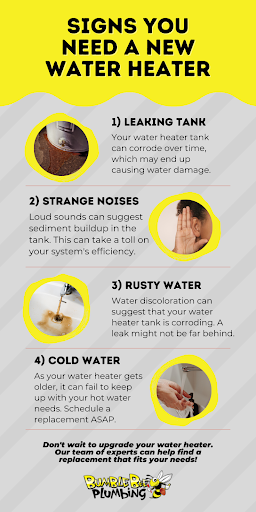As a homeowner, it’s easy to feel overwhelmed by the variety of water heater options on the market. Of course, you have your standard tank water heaters, but there are also tankless water heaters if you’re interested in conserving space in your basement. There are also many fuel types to choose from, with gas and electric being some of the most common options.
So, you’re probably wondering: is a gas or electric water heater better for your home? Unfortunately, answering this question isn’t as straightforward as it might seem. The type of water heater you install will most likely depend on your specific needs.
Below, we’ll review the factors you should consider when choosing between gas vs. electric water heaters.
What Are the Signs You Need a New Water Heater?
Before we can weigh the merits of gas and electric water heaters, it’s important to know if you need to replace your current unit in the first place. In some instances, you might only need a simple repair.
Consider using this guide to find out if it’s time for a water heater replacement:
Is a Gas or Electric Water Heater Better for Your Needs?
Although your water heater is hidden away in your basement, crawl space, or garage, this doesn’t make it any less critical. It’s not a stretch to say that this appliance is one of the most important components in your home, as it supplies you with the hot water necessary to wash your hands, clean your clothes, and shower.
Since water heaters are so crucial to everyday life, you must take the time to find the perfect replacement for your family’s needs. That’s why weighing the pros and cons of gas vs. electric water heaters is necessary.
Let’s go over some factors that can significantly impact the type of water heater you decide to install in your home.
Fuel Requirements
When it comes to fuel type, you might be wondering: is a gas or electric water heater better? All-in-all, the answer to this question will depend on your current situation.
For some homeowners, one of the significant disadvantages of gas water heaters is that they require gas lines. Like with a gas heater, you’ll need to install a gas line on your property if you wish to upgrade to a water heater that runs on this fuel type. Installing a gas line will, unfortunately, add to your upfront costs.
However, it’s crucial to recognize that water heaters operating on electricity can also have downsides. For example, electric units won’t be able to heat your water during a power outage — which can be highly inconvenient if you live in an area prone to power failure.
Overall Performance
When installing a water heater in your home, you want to have peace of mind knowing that the unit will keep up with your hot water needs. When it comes down to it, you can typically expect gas water heaters to heat the water in the tank much faster than electric-powered units.
One of the most notable disadvantages of electric water heaters is their slow heating capabilities. This particular issue can be especially worrisome if you have a large household that is constantly using hot water.
The good news is that you typically won’t have to worry about running out of hot water, so long as the water heater is properly installed. That’s why it’s incredibly important to work with an installation expert that will correctly size the water heater to fit your home’s size and hot water requirements.
Energy Efficiency
When discussing the merits of installing gas vs. electric water heaters, it’s impossible not to mention efficiency. So many people throughout the country are constantly looking for ways to make their homes more energy efficient. The more efficient your water heater is, the less energy you’ll waste — and the more money you can save on your energy bills.
Overall, it’s believed that gas-powered water heaters are generally more efficient than their electric counterparts. However, this isn’t to say that electric water heaters can’t be just as energy efficient.
Your water heater’s exact energy rating will depend on the type of make or model you install. Many electric-powered models are equally as efficient as gas units. That’s why you should weigh your options with the help of a professional installer.
Installation Costs
Now you’re probably wondering: is a gas or electric water heater better in terms of upfront costs? When all is said and done, gas units tend to cost more to install than their electric counterparts.
However, it’s also crucial to factor in the fact that the cost of natural gas tends to be cheaper than electricity. This means you can potentially enjoy lower operating costs with a gas water heater.
Of course, the price you end up paying can vary depending on various factors. You’ll want to consult a professional contractor who will give you a quote for a water heater installation that fits your budget and needs. If you’re ready to get started, don’t hesitate to reach out to our plumbers in Glendale, AZ, for more information or to request an estimate.
Install a Highly Efficient Water Heater Today!
As you can see, there are many pros and cons to installing gas vs. electric water heaters. You’ll want to think about installation costs, efficiency, and the type of power source the unit runs on — among other factors — before deciding on your home.
Whether your current water heater is leaking at the bottom of the tank or simply won’t heat your water like it used to, don’t wait to contact Bumble Bee Home Services for a replacement! We specialize in everything from standard water heaters to tankless systems to meet a wide range of needs. You can also turn to us for water heater repair in Phoenix, AZ.
Contact us today to schedule an appointment! We’re happy to discuss our traditional and tankless water heaters to help you find the perfect fit.



